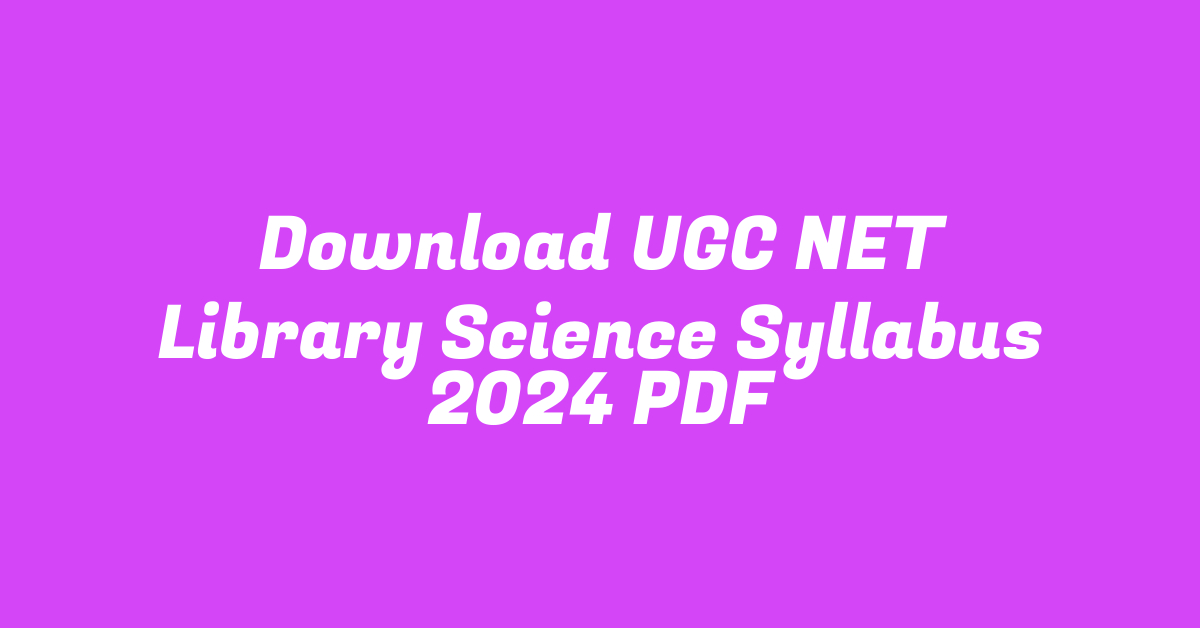UGC NET December 2024 cycle will be conducted from January 1, 2025 to January 19, 2025 on the official website. Candidates preparing for NET Library Science must be looking for the UGC NET Library Science Syllabus 2024. Candidates will get the National Eligibility Test Library Science Syllabus in detail in the following article. NET Library Science Syllabus 2024 helps the candidates to understand its vastness and extent. Check the following article for more details about NTA NET Library Science Syllabus 2024.
UGC NET Library Science Syllabus: Overview
UGC NET Library Science exam is conducted by NTA on behalf of UGC NET. NET Library Science examination is conducted online at national level. For more details, candidates need to see the following table.
| ugc net library science syllabus | |
| name of exam | National Eligibility Test (NET) |
| steering body | National Testing Agency (NTA) |
| Examination conducted in a year | twice a year |
| method of examination | Online |
| types of questions | Multiple Choice Questions (MCQ) |
| number of papers |
|
| number of questions | 150 |
| time period | 3 hours |
| negative marking | No |
ugc net library science exam pattern
Candidates are highly recommended to go through the NET Library Science Exam Pattern essentially. This will help them understand the nuances and intricacies of the UGC NET syllabus for Library Science exam pattern in detail. Candidates have to appear for Paper I (General Section) and Paper II (Relevant Subject).
| ugc net library science exam pattern | |
| correct answer | 2 points |
| wrong/wrong answer | no negative marking |
| unanswerable question | Zero |
| number of questions | 150 questions |
| total number of points | 300 points |
| letters | Paper I and Paper II |
| exam period | 3 hours |
UGC NET Library Science Marks Distribution
Candidates will have to answer 150 questions in 3 hours. Each question carries 2 marks and there is no negative marking. There are two papers – Paper I (50 questions) and Paper II (100 questions). Questions are objective type multiple choice in nature. Candidates should see the following table for more details.
| UGC NET Library Science Marks Distribution | |||
| paper | Mark | Number of Questions (All are Compulsory) | exam period |
| Paper I | 100 | 50 | 03 hours |
| Paper II | 200 | 100 | |
ugc net library science syllabus
Here is the detailed outline of UGC NET Library Science Syllabus. For more detailed information candidates should see the following table.
| ugc net library science syllabus | |
| units | Subject |
| Unit – I |
|
| Unit – II |
|
| Unit – III |
|
| Unit – IV |
|
| Unit – V |
|
| Unit – VI |
|
| Combined – Seventh |
|
| Unit-VIII |
|
| Unit – IX |
|
| unit-x |
|
ugc net library science syllabus pdf
Candidates should use the UGC NET Library Science Syllabus PDF for a detailed understanding of the intricacies and nuances of the syllabus. All the topics are covered in depth in each unit.
| ugc net library science syllabus pdf | |
| ugc net library science syllabus | pdf link |
| ugc net library science syllabus pdf hindi | Click here |
| ugc net library science syllabus pdf english | Click here |
ugc net library science syllabus
The UGC NET Library Science syllabus covers a wide range of topics aimed at providing a comprehensive understanding of the field. It begins with an overview of library and information science as a discipline, including the purposes and functions of libraries and their importance as social institutions. The course also covers important aspects such as library law in India, with emphasis on the legal framework governing libraries.
Furthermore, it explores the concepts of information, information science, and their role in shaping the information society. By studying this course, candidates gain a deep understanding of the theoretical foundations and practical aspects of library science, helping them excel in their academic pursuits and professional endeavours.
sharing is Caring!
